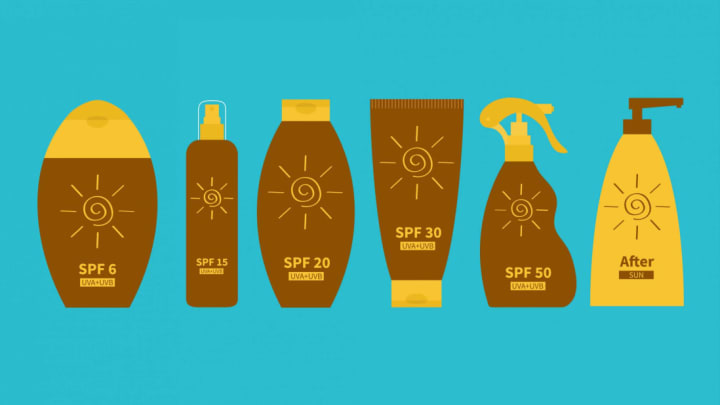Using sunscreen is one of the most important ways you can care for your body. Yet most of us don’t really understand how to properly wear it—or what the words (and numbers) on the bottle mean. Despite what you may believe, sunscreen isn't just for sunny summer beach days.
1. Sunscreen is your best protection against wrinkles, age spots, and sagging skin.
Let’s be clear: Sunshine is radiation. Exposure to that radiation damages and ages your skin, whether you can see it or not. All the fancy creams in the world can’t get rid of wrinkles once you have them, but you can help stave them off with regular and careful sunscreen use.
2. Sunscreen is not just for super pale people.
The sun doesn’t care what color your skin is, or if you have a tan already. Exposure to sunlight bombards your skin with damaging ultraviolet (UV) rays. It’s true that fair-skinned people have a higher likelihood of developing skin cancer, but that doesn’t mean those with more melanin are risk-free.
3. You need to wear sunscreen every day ...
We tend to associate sunscreen with bathing suits and flip-flops, but it’s not just for beach days. The sun is out there, rain or shine, even when you can’t see it.
4. … Even in the winter …
Sunscreen is especially important when you’re spending time near snow, ice, sand, or water—all substances that reflect light and intensify the radiation heading for your body.
5. … And indoors.
Surprise! Unless you’re in a totally windowless room, the sun can still get you when you’re inside. UVB radiation is blocked by glass, but UVA just streams right on in.
6. Reapplying sunscreen is just as important as applying it in the first place.
The directions on sunscreen bottles are not just designed to make you use and buy more sunscreen. You really should reapply every two hours, or more often if you’ve been sweating or in the water. That includes on your face, even if you’re wearing makeup. (If you don’t want to take off your makeup and start over—and who would?—you may want to check out sunscreen powders, which you can dust on over your makeup.)
7. A bottle of sunscreen should not last more than a few months.
Sunscreen loses its efficacy after about three years, but there’s no reason to have it around that long. Dermatologists recommend using 1 ounce of sunscreen (enough to fill a shot glass) to cover your body and face each day.
8. “Baby,” “sport,” and “waterproof” are just marketing terms.
“Sport” sunscreen still needs to be reapplied after sweating or swimming. “Baby” sunscreen may have fewer ingredients and be gentler on an infant’s skin, but small children should still wear hats and other protective clothing in strong sunlight. And there is no such thing as “waterproof” sunscreen—the FDA even prohibits manufacturers from claiming otherwise.
9. SPF is less important than regular use.
Sun protection factor, or SPF, is simply an indication of what percentage of the sun’s rays a product is blocking. Dermatologists recommend using SPF 30 or higher, but higher SPFs do not protect you for longer, and definitely don't excuse you from reapplying.
10. You don't need sunlight to get vitamin D.
Most Americans get all the vitamin D they need from their diets and incidental time in the sun. Unless your doctor tells you to—and they won’t—there is no reason to intentionally expose yourself to ultraviolet radiation.
11. Sunscreen is not enough sun protection on its own.
Sunscreen is super-important, but it’s not the only thing you can do to protect yourself. Hats, beach umbrellas, and lightweight long-sleeved shirts are your friends.
A version of this article originally ran in 2016; it has been updated for 2021.
